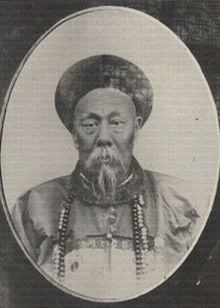Dong Fuxiang
| Dong Fuxiang | |
|---|---|

Dong Fuxiang
|
|
| Born | 董福祥 1839 Gansu |
| Died | 1908 |
| Allegiance |
|
| Years of service | 1862–1908 |
| Rank | general |
| Unit | Kansu braves |
| Battles/wars | Dungan revolt, Dungan Revolt (1895), Boxer Rebellion |
| Dong Fuxiang | |||||||||
| Traditional Chinese | 董福祥 | ||||||||
|---|---|---|---|---|---|---|---|---|---|
| Simplified Chinese | 董福祥 | ||||||||
|
|||||||||
| Transcriptions | |
|---|---|
| Standard Mandarin | |
| Hanyu Pinyin | Dǒng Fúxiáng |
| Wade–Giles | Tung Fu-hsiang |
Dong Fuxiang (1839–1908), courtesy name Xingwu (星五), was a Chinese military general who lived in the late Qing dynasty. He was born in the western Chinese province of Gansu. He commanded an army of Hui soldiers, which included the later Ma clique generals Ma Anliang and Ma Fuxiang. According to the Western calendar, his birth date is in 1839.
Dong Fuxiang was a non-Muslim Han Chinese general who commanded Muslim Hui soldiers. Conflicting accounts were given about his religion and ethnicity. Contemporaneous Western sources claim he was Muslim, which was a mistake, but modern Western sources either say he was not Muslim, or did not mention his religion at all when talking about him, and some mistakenly still say he is Muslim. The only thing that was clear about him was that he was familiar with the Muslim militia of Gansu, and commanded Muslim troops in battle. The British consular officer Erich Teichman traveling in Gansu was repeatedly told that Dong Fuxiang was Han Chinese and not a Muslim, but the consular officer insisted on wrongly believing he was a Muslim. The confusion over his religion was cleared up by Jonathan Neamen Lipman who noted that westerners had made the mistake of assuming that Dong was a Muslim since he commanded Muslim soldiers during the Boxer Rebellion, and the mistake was repeated by later western encyclopedias and works on Islam and on the Boxer Rebellion.
The Chinese Muslim armies of Dong Fuxiang were known as the Kansu Braves and they fought against the German Army and the other 8 nation alliance forces, repeatedly at the First intervention, Seymour Expedition, China 1900. It was only on the second attempt in the Gasalee Expedition did the Alliance manage to get through to battle the Chinese Muslim troops at the Battle of Peking. However, Kaiser Wilhelm II was so alarmed by the Chinese Muslim troops that he requested the Caliph Abdul Hamid II of the Ottoman Empire to find a way to stop the Chinese Muslim troops from fighting.
...
Wikipedia
